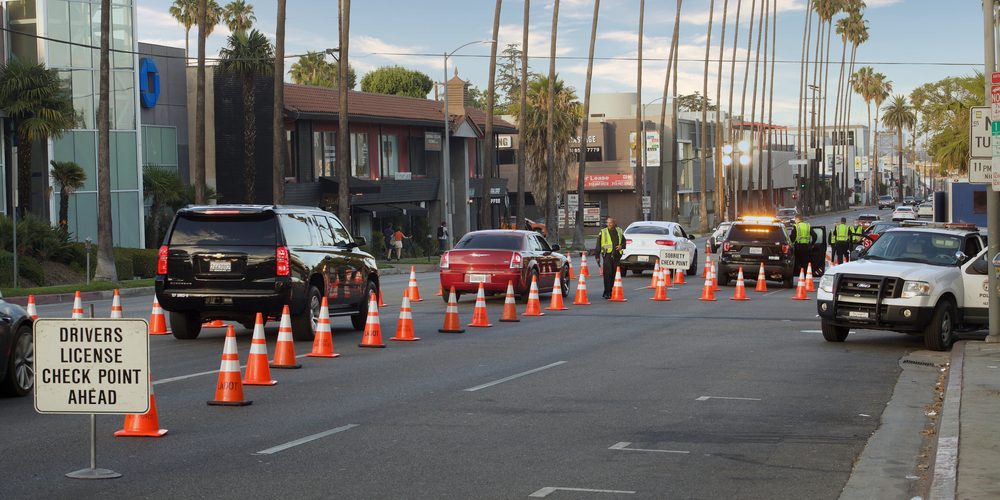Driving under the influence (DUI) or driving while intoxicated (DWI) checkpoints have long been a tool employed by law enforcement agencies to identify and arrest impaired drivers. While their effectiveness in enhancing public safety is often heralded, they have also been a subject of contention, particularly concerning their constitutionality. Let’s delve into the debates surrounding DUI/DWI checkpoints and explore how different states interpret and apply them.
The Case For Checkpoints: Enhancing Public Safety
Proponents argue that DUI/DWI checkpoints serve a crucial public safety function. The mere presence of these checkpoints can act as a deterrent, discouraging potential drunk drivers from getting behind the wheel.
Supporting Case Law
Michigan Dept. of State Police v. Sitz (1990): The U.S. Supreme Court held that, despite being a “seizure” under the Fourth Amendment, the interest in reducing alcohol-impaired driving was sufficient to justify sobriety checkpoints. The Court reasoned that the state’s interest in preventing drunk driving accidents outweighed the minor infringement on a driver’s Constitutional rights.
The Case Against Checkpoints: Constitutional Concerns
Critics argue that DUI/DWI checkpoints infringe on individual rights, specifically pointing to the Fourth Amendment, which protects against unreasonable searches and seizures.
Concerns Include:
- Lack of Individual Suspicion: Traditional law enforcement stops require some level of individual suspicion. Checkpoints, however, stop drivers without any suspicion of wrongdoing, which critics claim is a violation of individual rights.
- Potential for Abuse: Without clear guidelines and oversight, there’s a possibility for racial or socioeconomic profiling.
Supporting Case Law:
City of Indianapolis v. Edmond (2000): The U.S. Supreme Court ruled that drug checkpoints, which are similar in nature to DUI/DWI checkpoints, were unconstitutional as their primary purpose was for ordinary criminal wrongdoing and not an “immediate, vehicle-bound threat to life and limb.”
State Differences: A Patchwork of Interpretations
While the U.S. Supreme Court has given the green light to DUI/DWI checkpoints, individual states have the authority to impose their interpretations or ban them altogether.
States That Allow Checkpoints
Many states, including California and Florida, allow DUI/DWI checkpoints, citing public safety and the reduction in alcohol-related accidents. They even require that police departments inform the public about upcoming DUI/DWI checkpoints, which might seem counterintuitive, but there is no benefit to the element of surprise for a checkpoint, rather the knowledge of an upcoming checkpoint is an effective means to deter intoxicated driving.
States That Prohibit Checkpoints
Currently, 10 states don’t conduct sobriety checkpoints, primarily due to state laws or interpretations of state constitutions that view them as infringements on individual rights.
- Arkansas
- Idaho
- Iowa
- Michigan
- Minnesota
- Montana
- Oregon
- Rhode Island
- Texas
- Washington
- Wisconsin
- Wyoming
Guidelines for Conducting Checkpoints
In states where checkpoints are allowed, law enforcement must typically adhere to strict guidelines, like ensuring that the checkpoints are publicly advertised in advance, using a neutral formula for stopping vehicles (e.g., every fifth car), and minimizing the duration of individual stops.
Many police departments even publish the results of their checkpoints in the days or weeks after they are held, meaning that the public can see exactly what took place throughout its duration. Coupled with the public knowledge of state grants which fund those checkpoints, citizens can determine for themselves whether or not the checkpoints are effective or yielding an adequate return on investment.
Constitutionality is Complicated
The constitutionality of DUI/DWI checkpoints continues to be a delicate balancing act between public safety and individual rights. While the U.S. Supreme Court has upheld their legality, state interpretations vary widely, reflecting the broader national debate on the issue. As DUI/DWI prevention methods evolve, it’s crucial to remain informed about the legal implications and rights at play, especially for those who might find themselves navigating the intricate web of DUI/DWI laws and regulations.
If you have found yourself on the receiving end of a DUI/DWI charge, then use the form at the top of this page or call (800) 384-5297 for a free consultation.








